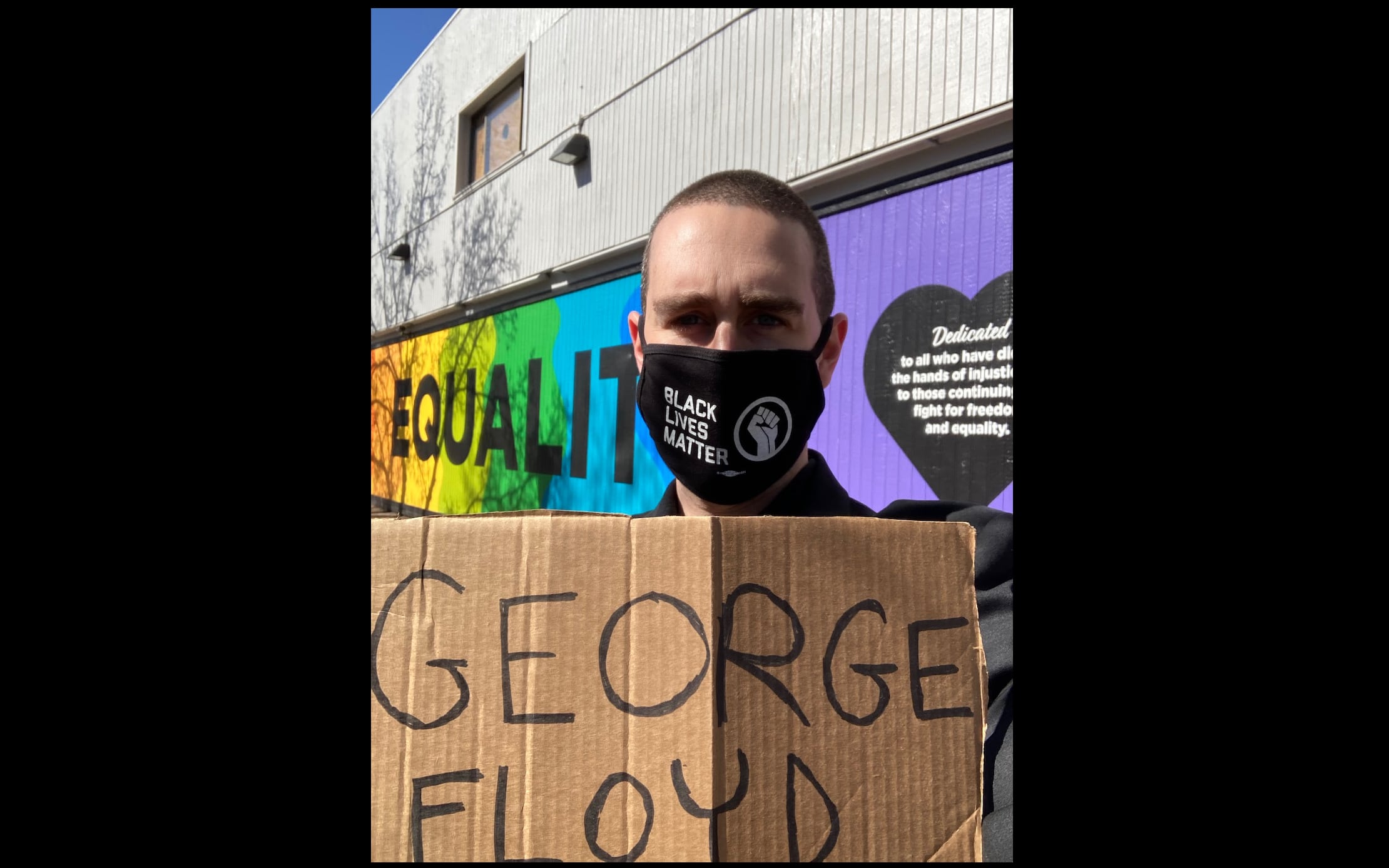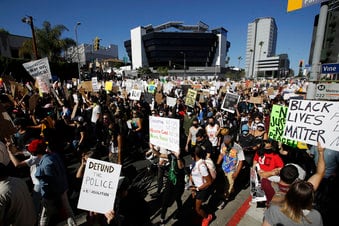The National Guard Bureau has issued a memo instructing state Guard units to stop applying Defense Department restrictions on protest participation to Guard troops who are not on active federal orders, Army Times has learned.
The July 26 memorandum, signed by Air Force Col. Kevin Mulcahy, NGB’s deputy director for manpower and personnel, was filed as part of the government’s response to a federal lawsuit by Army Capt. Alan Kennedy, a Colorado National Guard lawyer. Army Times obtained the memo through court records.
RELATED

The memo clarifies that Defense Department Instruction 1325.06, “Handling Dissident and Protest Activities Among Members of the Armed Forces,” does not apply to National Guard troops who are not “in a Title 10 duty status under federal command and control.”
The memo effectively means that the National Guard can’t restrict what protests its troops attend, save for specific and narrow circumstances.
National Guard troops most frequently serve in Title 32 or state active-duty statuses, in which they are under the command and control of their state or, when the Emergency Management Assistance Compact is activated, another state.
Title 10 orders are only used for Guard troops in situations that require presidential command and control. This includes mobilizations and deployments ordered by the president, individual volunteer tours with active-duty units, overseas training and certain NGB assignments.
The memorandum has significant ramifications in Kennedy’s ongoing lawsuit, which began in March. The case could also have far-reaching effects on the more than 440,000 members of the National Guard across the country.
The federal lawsuit
This March, Kennedy sued his chain of command, claiming it had unconstitutionally restricted his First Amendment rights when Colorado National Guard leaders issued him a pair of reprimands — one for his participation in a May 2020 Black Lives Matter protest, and a second for writing an opinion article in a local newspaper questioning his chain of command’s decision to investigate his protest participation. He also says they filed a negative evaluation as a result.
Kennedy was teargassed while participating in what was otherwise a peaceful daytime protest in Denver at the height of the nationwide protest movement in the wake of George Floyd’s death at the hands of police.
Kennedy’s first reprimand was for violating the Defense Department instruction that NGB now says shouldn’t have applied to him, because he was not in a Title 10 duty status during the protest.

The DoDI bans even off-duty troops from participating in protests where “violence is likely to occur” — and Colorado National Guard leaders had faulted Kennedy under that premise.
Initially, a Colorado National Guard investigation found Kennedy had not violated “any regulations, prohibitions, limitations, guidance, standards, policies or federal statute” by participating in the protest.
But Col. Charles Beatty, the state’s chief of staff who had ordered the investigation, modified the findings and added a recommendation that Kennedy receive a reprimand for participating in a protest where “violence was likely to occur.”
An investigation ordered by the state’s adjutant general, Army Brig. Gen. Laura Clellan, found that Beatty and Colorado Guard officials had a “good faith, yet mistaken understanding” of the protest rules in believing they applied to guardsmen not in a Title 10 duty status.
“As a result it was improper to investigate or reprimand CPT Kennedy for violation of DoDI 1325.06,” Clellan said in the investigation report, which Army Times obtained from court records. “The Department of Defense’s determination … was not available to the Colorado National Guard when the DoDI was applied to CPT Kennedy, so I find that command did not commit misconduct.”
Although the state has now acknowledged Kennedy was correct that he shouldn’t have been punished for participating in the protest, he is not satisfied with the result. And he is still fighting to have the second reprimand — which he received for protesting his chain of command’s decision to investigate his protest participation — and to have the allegedly negative evaluation withdrawn.
The path forward
Lawyers from the Colorado Attorney General’s Office and the U.S. Attorney’s Office, representing the Guard and Army leaders, asked a federal judge to dismiss Kennedy’s suit on Monday, according to court records.
The government’s attorneys argue the court can’t consider the issue because the Army hasn’t finished considering Kennedy’s administrative appeals of the second reprimand and the evaluation.
Government attorneys also said in their motion — which Army Times obtained via court records — that the first reprimand is now moot because it was destroyed after one year, plus the new memorandum clarifying the DoDI’s applicability means that it should not have been issued in the first place.
“We’re pleased that the military is conceding that my Black Lives Matter protest participation should never have been investigated or punished,” Kennedy said Thursday in a phone interview with Army Times.
But he said he’s trying to make a larger point: that all protest restrictions on off-duty troops are improper and unconstitutional. He pointed to the federal reserve components of the Army, Air Force, Navy and Marine Corps, whose members serve in a Title 10 duty status on a monthly basis.
“Does this mean that they’re prohibited from participating in Black Lives Matter protests simply because a general believes that ‘violence is likely to result?’” he said. “I could be put on Title 10 orders tomorrow, or be transferred to the Army Reserve. At that point, am I prohibited from protesting racism or writing op-eds about it? That’s why those are constitutional questions we need the court to decide.”
Kennedy described the Guard’s memo clarifying the applicability of the protest regulations as an “11th-hour memo.”
“It seems like the National Guard wants to make sure that the courts don’t address the constitutional questions while still punishing me for exercising my First Amendment rights.” he said.
Kennedy — who served as a presidential elector for Joe Biden in the 2020 Electoral College vote and unsuccessfully ran for the Colorado State Senate in 2018 — has seen his profile rise in recent months, partially due to the lawsuit.
The American Bar Association, a professional organization for attorneys, recognized Kennedy as one of the national group’s “top 40 young lawyers” this year. The ABA described him as “an outspoken advocate for justice” who, through the suit, “defended the right to protest racism.”
“The bottom line is that I don’t lose all of my constitutional rights, simply because I joined the military,” Kennedy said.
Davis Winkie covers the Army for Military Times. He studied history at Vanderbilt and UNC-Chapel Hill, and served five years in the Army Guard. His investigations earned the Society of Professional Journalists' 2023 Sunshine Award and consecutive Military Reporters and Editors honors, among others. Davis was also a 2022 Livingston Awards finalist.




